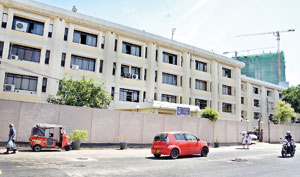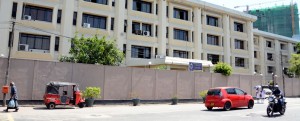News
Retired top cop’s death may point to medical negligence

The Police Hospital. Pic by Indika Handuwala
The Criminal Investigation Department (CID) has submitted an interim report after probing allegations of possible medical negligence with regard to the death of a retired high-level police officer at the Police Hospital in Narahenpita.
While the interim report has been submitted to the Inspector General of Police (IGP), Pujith Jayasundara, the CID probe will continue on the circumstances under which Retired Senior Deputy Inspector General (DIG) M.E.P. Leo Perera died on October 28, last year, the Sunday Times learns.
The Sunday Times understands that the Police Hospital has come out adversely in the interim report. However, confirmation on the contents could not be ascertained.
The IGP had instructed the CID to investigate the death of Mr. Leo Perera, following a complaint made by his son, Rohan, alleging possible negligence and lapses at the Police Hospital.
Mr. Rohan Perera, in letters also sent to the Association of Chiefs of Police and the National Police Commission, states that Mr. Leo Perera was obtaining treatment regularly from the Police Hospital for low blood counts.
“On October 26, last year, Mr. Leo Perera was taken to the Police Hospital at around 2 p.m. with high fever. He was taken there because his medical history was well-known at the Police Hospital, with records going back more than 10 years being available here,” states Mr. Rohan Perera.
On arrival at the Police Hospital on October 26, he was examined by a Medical Officer (MO) who considered his condition to be serious, but as there was no room available for him to be admitted, prescribed oral antibiotics and sent him home.
 He states that as there was no improvement in his condition, the next day (October 27), Mr. Leo Perera was once again taken to the Outpatients Department (OPD) of the Police Hospital at about 10.30 a.m. He was then admitted to Ward 6 as the rooms available for officers were occupied, with the only vacant/unoccupied room being reserved for the IGP.
He states that as there was no improvement in his condition, the next day (October 27), Mr. Leo Perera was once again taken to the Outpatients Department (OPD) of the Police Hospital at about 10.30 a.m. He was then admitted to Ward 6 as the rooms available for officers were occupied, with the only vacant/unoccupied room being reserved for the IGP.
“With the condition of my father being considered serious by the MO, he was prescribed an intravenous antibiotic around 11 a.m., which however was administered only at about 8 p.m., after a nine-hour delay,” alleges Mr. Rohan Perera, adding that the next day (October 28), an attendant of the Police Hospital informed the family that the patient had died.
He further states that the cause of death given after the Coroner’s Inquiry was septicaemia due to Myelodysplastic Syndrome. (A web search reveals that Myelodysplastic Syndrome is a blood disorder that causes a drop in the number of healthy blood cells due to the bone marrow producing abnormal cells that are not fully developed. Septicaemia, meanwhile, is blood poisoning or a very serious infection caused by large amounts of bacteria getting into the bloodstream.)
Mr. Rohan Perera alleges that:
· The outcome may have been different if the prescribed intravenous antibiotic was administered without a nine-hour delay.
· No senior doctor examined Mr. Leo Perera after admission to the Police Hospital.
· When Mr. Leo Perera’s pressure was unstable, a junior doctor allegedly incorrectly diagnosed that his condition was stable around 7.30 p.m. on October 27.
· Mr. Leo Perera was compelled to use the common restroom of Ward 6 which was unclean and he may have contracted harmful bacteria.
Pointing out that as a senior officer Mr. Leo Perera should have been given the room reserved for the IGP which was vacant, Mr. Rohan Perera states that their request to use this room was denied.
When the Sunday Times contacted the Chief Medical Officer (CMO) of the Police Hospital, Dr. Rohitha Fernando, who is the medical administrator, he declined to comment. He requested that the Police Spokesperson should be contacted. However, many attempts to contact the Police Spokesperson failed.
The Sunday Times learns that the Police Hospital which has more than 150 beds has 58 MOs, four full-time Consultants and six Visiting Consultants. The doctors have been seconded by the Health Ministry and some have permanent mobilisation with the Police Force.
Retired senior police officers told the Sunday Times that the ‘dual control’ of the Police Hospital has led to its decline. The Police Hospital is under the CMO who is a Reservist Police Officer of Senior Superintendent of Police (SSP) rank who looks after the medical functions as well as the Director of the Police Medical Services who is also of SSP rank who looks after the administrative functions. The Director is overseen by a Senior DIG (Support Services) based at Police Headquarters who has numerous other tasks as well.
“What is ‘lacking’ is a Coordinator, senior to both the Director and the CMO, to ‘coordinate’ the medical and administrative functions. This has led to serious shortcomings at the Police Hospital,” a retired DIG said.
Another retired DIG pinpointed the following:
n Non-appointment of a permanent Radiologist, a Microbiologist and two Physicians.
n Not activating the Hospital Development Committee which comprises medics and finance and logistic experts.
n Non-maintenance of the operating theatre, the intensive care unit, laboratories and sensitive equipment.

